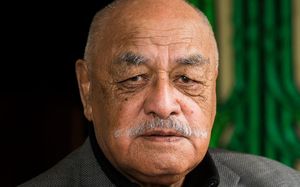
This post is part of an assessment for a paper on "Applied Practice in Context", part of the Postgraduate in Digital and Collaborative Learning programme offered by Mindlab and UNITEC.
Kaitiakitanga: (noun) guardianship, stewardship, trusteeship, trustee.(Maori Dictionary)
What really resonates for me with the concept of kaitiakitanga is the sense of oneness and interconnectedness with all things that underpins the notions of guardianship, stewardship and trusteeship.
 |
| Dr Apirana Mahuika http://www.radionz.co.nz/news /te-manu-korihi/265607/tributes-flow -for-'uncle-api' |
Dr Mahuika also talks of the importance of relationships over partnerships, whanau and whanaungatanga and that "our relationship to one another is the driving force which has enabled us to survive in the past and in the future". However, "one size does not fit all" - all Maori are not the same! At ASHS we value respectful student-teacher relationships as we "are on the learning journey side by side" and students are encouraged to "be themselves" which echoes Dr. Mahuika's view.
 |
| http://www.globalonenessproject.org /people/dr-rangimarie-turuki-rose-pere |
"I have a right to be me; who I am. Be yourself. Be true to yourself. Don't worry how you look for others. All waters want to reflect my image!"
"Our similarities and differences are to be celebrated. It would be boring if only Maori people existed" Dr. Rose Pere
In a school setting this can be reflected by ensuring that students have a right to be themselves and respected for it. That is, for example, " to be Maori and be successful as Maori". I use "eco respect - respect for the environment, community and ourselves" as a concept with my students which we explore together and co-construct a way of being in our learning environment.
Interconnectedness is a concept that prevails, not only with Maori but with indigenous people across the globe. Centuries old knowledge and practices, or traditional science has the potential to interweave with "modern" western science which is seeking to explain "scientifically" what has been know for years. However, modern science does not accept traditional science as equal. Yet, there is potential for the two to interweave: be interconnected. Where is the interconnectedness when we teach? Students go into one class and "do science" then go to another class and "do art" and so on.......Shouldn't we be considering breaking down these "subject silos" and helping students understand how different subjects inter- relate in the real world? Wouldn't it be fantastic if our education system could model this. It is starting to happen in some schools such as Hobsonville Point Secondary School and to some degree during Impact Projects as Albany Senior High School.
It is important that as teachers, wherever possible, we share with our students not only from the lens of a modern western system but establish links with the beliefs, customs, practices and knowledge of our indigenous people. Within the technology curriculum (NZC, 2007) the "Nature of Technology" strand provides space for this to occur. However, it MUST not be tokenism. To avoid this teachers would (and should) be required to gain a deeper understanding of Te Ao Maori (the Maori world) and to "challenge the assumptions inherent in western knowledge, science and modern education theory" (Dr. Marie Baptiste) or at the very least give equal weighting to both.

No comments:
Post a Comment